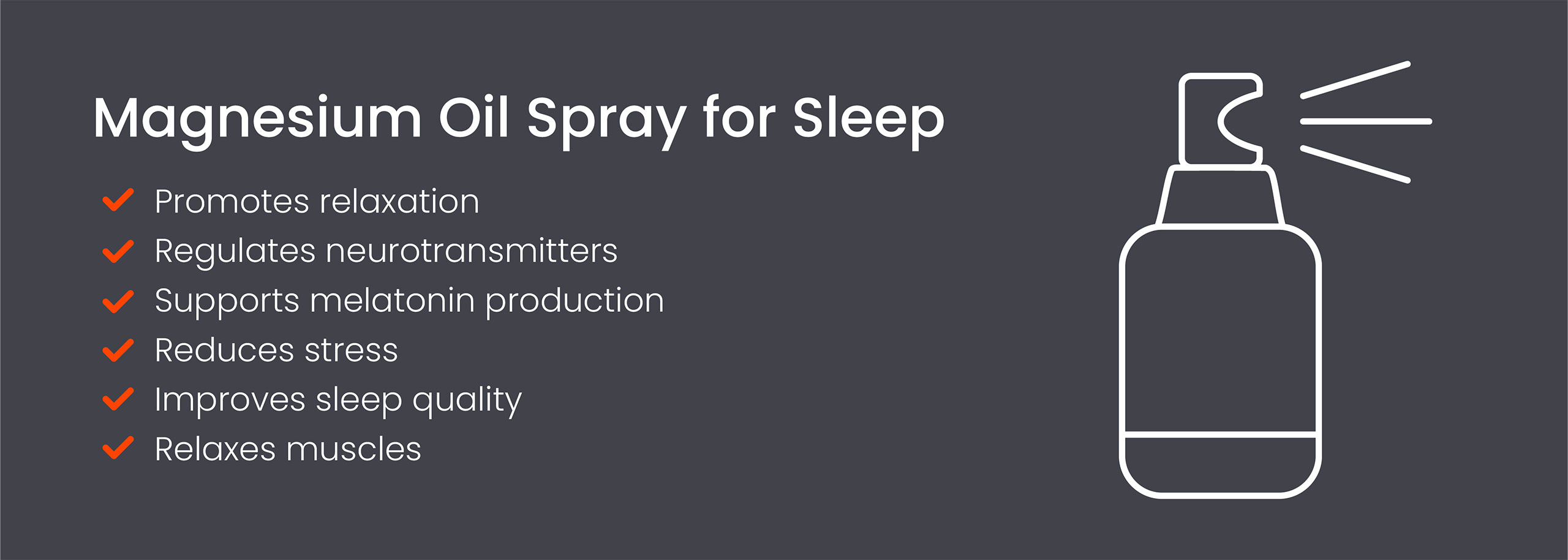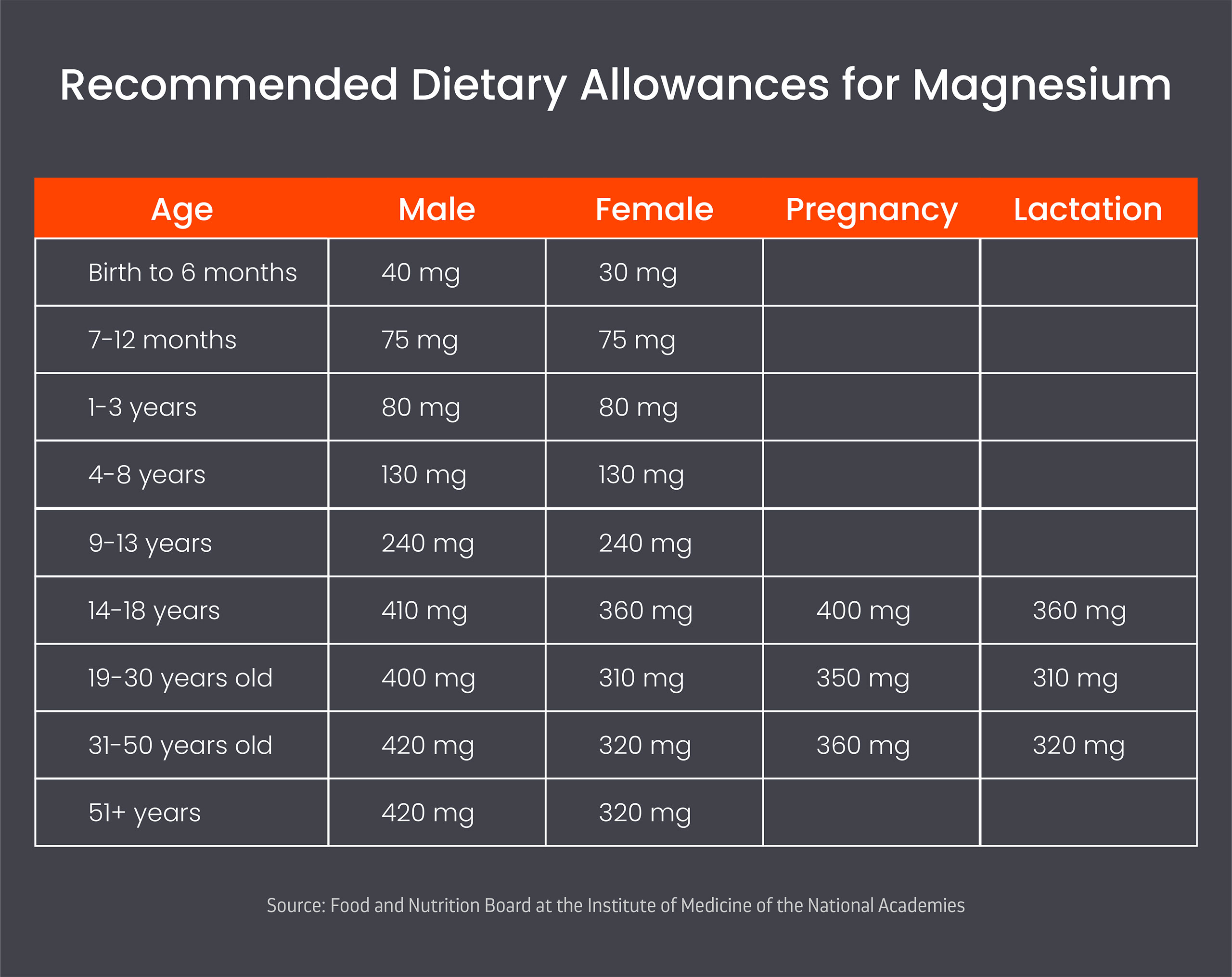Magnesium Oil Spray for Sleep: Where to Put it & How it Works

How to Use Magnesium Oil Spray for Sleep
Magnesium, a vital mineral, participates in numerous bodily processes, including the functioning of muscles and nerves, regulation of blood sugar, and maintenance of bone health. However, recent research has highlighted its role in promoting better sleep quality.
Many people suffer from magnesium deficiency, which can contribute to sleep disturbances such as insomnia and restless leg syndrome. Magnesium supplements have become a popular natural remedy for improving sleep.
One convenient form of magnesium supplementation is magnesium oil spray. Magnesium spray for sleep is a topical solution that’s applied directly to the skin. Keep reading to learn more about magnesium, where to put magnesium oil for sleep, and how this topical solution can help you sleep better.
- What Is Magnesium?
- What Is Magnesium’s Relationship with Sleep?
- How Does Magnesium Oil Spray Work?
- Where Should You Apply Magnesium Oil Spray for Sleep?
- How Much Magnesium Is Recommended?
- What Are Additional Tips to Improve Sleep Quality?
- Wrapping Up: Using Magnesium Oil Spray for Sleep
What is magnesium oil spray?
Magnesium oil spray is a topical form of magnesium supplementation that’s applied directly to the skin. Despite its name, it’s not an oil but rather a concentrated solution of magnesium chloride dissolved in water.
Compared to other forms of magnesium supplements like oral supplements, topical creams, roll-on magnesium, and bath salts, magnesium spray offers several advantages. Unlike oral supplements, which can cause GI issues or have a laxative effect when taken in high doses, magnesium oil spray is applied externally, minimizing the risk of digestive side effects.
Additionally, because it’s absorbed directly through the skin, magnesium oil spray may bypass issues related to poor absorption in the digestive tract.
Topical creams and roll-on magnesium products are also applied directly to the skin but may contain additional ingredients like oils, fragrances, or emulsifiers. On the other hand, magnesium spray typically only consists of magnesium and water, making it a simpler supplementation.
Bath salts are another popular option, but they require soaking in a bath to achieve absorption through the skin. Magnesium oil spray offers a more convenient alternative for those who may not have time for a bath or prefer not to soak in magnesium-infused water.
What Is Magnesium’s Relationship with Sleep?
Magnesium plays a crucial role in various internal processes closely linked to sleep. It’s known for its muscle-relaxing properties, which can be beneficial for promoting sleep. Adequate magnesium levels help regulate muscle contractions and prevent muscle cramps or spasms that may disrupt sleep.
Research suggests that this mineral can alleviate restless leg syndrome (RLS) symptoms, marked by unpleasant sensations in the legs that intensify during nighttime.

Magnesium is also involved in regulating neurotransmitters, including gamma-aminobutyric acid (GABA), known for its calming effects on the brain. GABA serves as an inhibitory neurotransmitter that aids in decreasing neuronal excitability, fostering feelings of relaxation and drowsiness. Magnesium ensures optimal GABA levels for sleep.
Your circadian rhythm, also known as your body’s internal clock, regulates the sleep-wake cycle. Magnesium may help regulate sleep patterns and promote sleep onset at night. Magnesium has also been shown to have stress-reducing effects on the body, which can indirectly contribute to better sleep. Chronic stress and anxiety can disrupt sleep by preventing relaxation. Magnesium helps stimulate the body’s stress response, reducing cortisol levels and promoting the calmness necessary for sleep.
How Does Magnesium Oil Spray Work?
Magnesium spray for sleep is a topical solution absorbed into the bloodstream after it’s sprayed on the skin. When sprayed onto the skin, the magnesium is absorbed transdermally, bypassing the digestive system and entering the bloodstream directly.
This method of absorption is believed to be more efficient than oral supplements for some, particularly those who have digestive issues or difficulty absorbing magnesium through the digestive tract.
Once absorbed, magnesium works by promoting relaxation and regulating various bodily functions. By applying magnesium spray to specific target areas, such as those prone to muscle cramps or tension, you can address these issues to prevent them from interfering with your sleep.
For instance, massaging magnesium oil onto the legs can help alleviate restless leg syndrome. It can also relax the muscles and promote a sense of calmness, all of which are necessary for better sleep quality.
Where Should You Apply Magnesium Oil Spray for Sleep?
You can technically apply magnesium oil for sleep anywhere on the skin. Unfortunately, topicals aren’t absorbed as well through the skin compared to oral supplements. However, research suggests that spraying magnesium oil near hair follicles can enhance its permeation into the skin, so spraying it on your hair and lightly massaging it in before bed can help it absorb through the skin and into the bloodstream.
How Much Magnesium Is Recommended?
The Food and Nutrition Board (FNB) at the Institute of Medicine of the National Academies offers intake recommendations for magnesium, with values varying by age and sex.
The current recommended dietary allowance for magnesium for males aged 19-30 is 400 mg. For females of the same age range, it’s 310 mg. For older adults, the allowance ranges from 320 to 420. Pregnant and nursing women also have specific recommendations.

As for magnesium oil spray, many brands recommend different dosages, typically ranging from 5-20 sprays per application. The exact number of sprays may depend on the concentration of magnesium in the product and your needs. You can follow the instructions provided by the specific brand of magnesium oil spray you’re using.
What Are Additional Tips to Improve Sleep Quality?
While magnesium may help promote better sleep, it may not work for everyone. Along with the use of magnesium oil for sleep, there are several other tips you can try to improve your nightly rest, such as:
- Establish and stick to a nightly routine: Having a regular bedtime routine helps your body know when it’s time to sleep, making it easier to fall asleep at night. This sleep hygiene routine might include activities like reading a book, taking a warm bath, or meditation. Depending on the time of day, you may also want to avoid napping, especially if you know it prevents you from falling asleep on time.
- Create a relaxing sleep environment: Investing in a comfortable mattress and high-quality bedding sets can make a noticeable difference in how well you sleep. Choose bedding and pillows that support your preferred sleep position and keep your bedroom cool, quiet, and dark to promote restfulness.
- Exercise regularly: Exercising is linked to improved sleep quality and can help alleviate symptoms of insomnia. While you should exercise most days of the week, try to avoid vigorous activity too close to bedtime, as it may impact your ability to fall asleep.
- Ensure a healthy diet: Eating and drinking can also affect your sleep quality. Eat foods with melatonin before bed to help you fall asleep faster, and maintain a balanced diet while staying hydrated throughout the day. Steer clear of eating big meals or drinking caffeine or alcohol right before bed, as they can disrupt sleep patterns.
- Listen to white noise: White noise for sleep, such as the sound of a fan or a white noise machine, can help mask background noises that might otherwise disturb your sleep. White noise creates a consistent, soothing sound that can help you relax and fall asleep easier. You can experiment with different types of white noise to find which helps you sleep better at night.
- Limit screen time before bed: The blue light from gadgets like your phone, TV, or computer can interfere with your body’s sleep cycles. Limit digital screen time at least one hour before bed to promote better sleep. Consider replacing digital activities like scrolling through your phone, working, or checking your email before bed with activities like listening to music before sleep or light stretching to help you relax.
The Advantage of Using Magnesium Oil Spray for Sleep
Magnesium oil spray is a convenient and effective way to supplement magnesium levels and improve sleep quality. This transdermal absorption allows magnesium to exert its muscle-relaxing and stress-reducing effects, promoting relaxation and better sleep. Alongside supplementation, incorporating sleep-promoting strategies into your nighttime routine, exercising regularly, eating well, and listening to white noise can further enhance your sleep quality and help you go to sleep earlier.
We understand the importance of sleep. That’s why Layla offers a range of products to help you sleep better. From high-quality hybrid mattresses to bedding and pillow sets, at Layla, we provide solutions to create a comfortable sleep environment.







